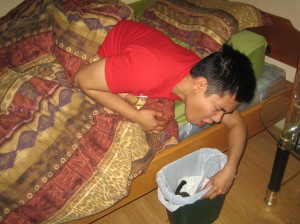The shiitake mushrooms have been a traditional food that is also utilized as medicine in Asian countries. The mushrooms also grow on oak logs and are known to be low in calories but packed with minerals such as zinc and potassium. These mushrooms are not poisonous than the other types. It is important to note that any processed foods can be contaminated at some point in the growing, processing or preparation process. Some individuals can also end up with allergies to shiitake mushrooms that cause symptoms that are somewhat similar and can be mixed up with food poisoning.
Contamination during the growth period
The shiitake mushrooms can become contaminated by animal droppings or infected water while they are growing. Bacteria such as salmonella and E. coli can cause sickness among those who eat contaminated food. The ideal way to prevent food poisoning is to wash the shiitake mushrooms thoroughly under flowing water before they are eaten. If vegetable washes are used, they might not completely remove the contaminants. In most cases of food poisoning, the usual symptoms include abdominal pain, diarrhea, vomiting and oftentimes fever. By enrolling in a class on first aid today in your area, you can readily manage these symptoms.

Contamination during the processing phase
Contamination by bacteria can occur during the processing or due to faulty packaging. The fresh shiitake mushrooms that are packed in unrefrigerated sealed containers can be sources of botulism due to Clostridium botulinum which reproduces even with limited oxygen supply.
When buying fresh mushrooms, it is important to check the packaging if there are holes in it to allow air to circulate. The fresh mushrooms must be stored in the refrigerator after buying for up to 5 days. The symptoms of botulism which usually start between 12-36 hours after eating the contaminated mushroom typically include vomiting, nausea, stomach pain, facial weakness, difficulty swallowing or speaking and muscle paralysis. It is best to seek immediate medical care if botulism is suspected.
Contamination during cooking
In case those who handle the mushrooms carry certain intestinal viruses or bacteria, they can easily pass them on to others by not carefully washing hands before handling. Even though cooking can destroy some of the viruses and bacteria, the shiitake mushrooms are usually served as an ingredient in salads or other uncooked dishes.
Since you cannot tell if bacteria are present, it is impossible to determine if the mushrooms will make you sick. Diarrhea, vomiting, abdominal pain or fever after eating shiitake mushrooms would surely require immediate medical care for possible food poisoning.
Allergic reaction
An allergic reaction to shiitake mushrooms can be confused with food poisoning since the symptoms of both are strikingly similar. Take note that ingesting more than 15-20 g in a day of whole shiitake mushrooms can lead to rashes, diarrhea and bloating.
